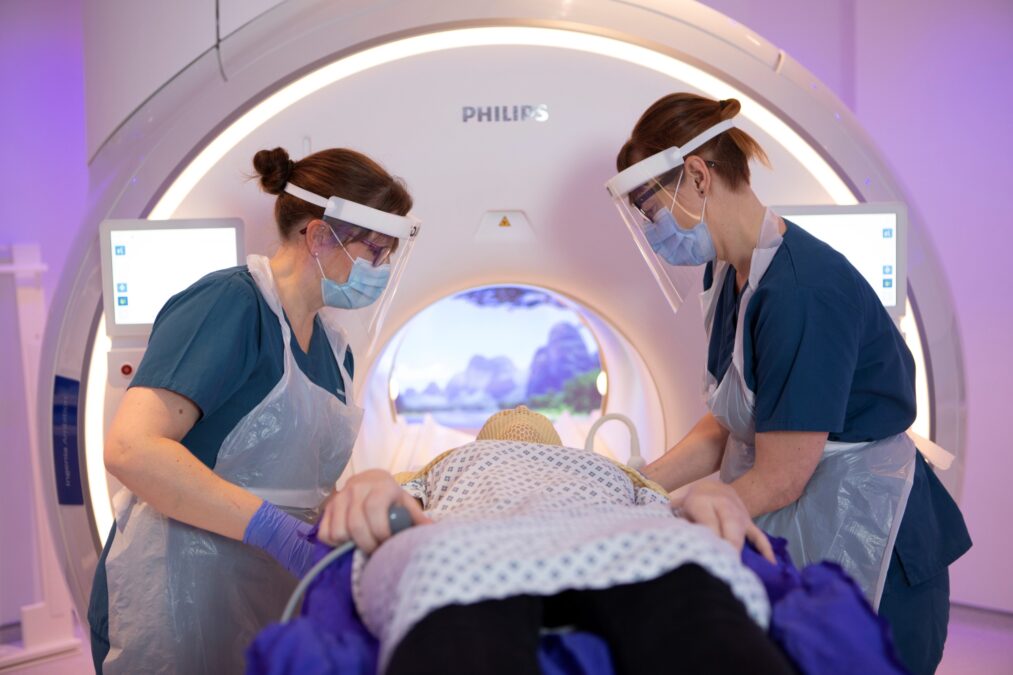Proton beam therapy is a type of radiotherapy which uses high-energy protons to target and destroy cancer cells. Due to its precise targeting, allowing optimal delivery of radiation to the tumour, while reducing radiation dose to surrounding healthy normal tissues and so reducing side effects, proton beam therapy may be suitable for the treatment of brain cancer and some benign brain tumours in both adults and children.
Treatment options for brain cancer or brain tumours will vary depending on the type, extent and location of the cancer. It may include one or a combination of surgery, radiation therapy including proton beam therapy, chemotherapy and targeted drug therapy.
In general, brain tumours can be benign (non-cancerous) or malignant (cancerous). Benign brain tumours are usually slow growing and affect around 6,500 people per year in the UK. Malignant brain tumours are typically faster growing than benign, and each year around 5,800 people are diagnosed in the UK.
The treatment of brain tumours requires a multidisciplinary approach due to its complexity. Specialised healthcare professionals, including radiation oncologists, surgeons, medical oncologists, radiologists and pathologists assess each patient’s case and determine the most suitable treatment plan in a multidisciplinary team (MDT) meeting.

Treatment options for brain tumours may involve surgery, radiotherapy (including proton beam therapy), chemotherapy, and targeted drug therapies and will be dependent on the type, location and size of the brain cancer and your general health.
What Are The Next Steps After Being Diagnosed With a Brain Tumour
Following a diagnosis of a brain tumour, you will be under the expert care of a multi-disciplinary team (MDT) of healthcare specialists. The team will include specialist surgeons, radiation oncologists, medical oncologists, pathologists and radiologists, all of who have expertise in diagnosing, treating and managing brain tumours.
An MDT is focused on achieving the best clinical outcomes for you.
When determining the best course of treatment, the team will take into consideration the type, location and size of the tumour, your age and general health.
Why Proton Beam Therapy is Effective for Brain Tumours
Proton beam therapy is a type of radiotherapy that is considered a good treatment option for certain types of brain cancers and brain tumours for several reasons:
- Precise targeting: Proton beams can be precisely aimed and controlled to deliver radiation to tumour cells while sparing surrounding healthy tissue. This precision is crucial when brain tumours are located near critical structures. This is especially important for benign tumours, for which minimising side effects is a key aim of treatment.
- Reduced side effects: By sparing healthy brain tissue, proton beam therapy can potentially reduce the risk of side effects and improve outcomes for patients.
- High dose delivery: Proton beams can deliver a high dose of radiation directly to the brain tumour, while sparing dose to surrounding healthy tissues, increasing the chances of controlling the tumour in the long term.
- Favourable outcomes: Clinical studies suggest that PBT can result in high rates of tumour control and fewer side effects for certain types of brain tumours.

Sometimes called particle therapy, it is very precise in how it delivers a dose to the brain tumour, and it is this enhanced precision compared to radiation dose used with photon therapy that provides particular benefits for the treatment of certain brain tumours.
Determining Eligibility for Proton Beam Therapy for Brain Tumours
Determining whether proton beam therapy (PBT) is a suitable treatment option for your brain tumour depends on several factors.
The decision is typically made by a multidisciplinary team of specialist healthcare professionals, including radiation oncologists, neurosurgeons, and medical oncologists. Here are some key considerations:
- Tumour type and location: Proton beam therapy has been used to treat brain tumours and cancer. It is often considered suitable for tumours located close to critical structures, such as the brain and spinal cord, where precision in delivering radiation is crucial.
- Tumour size and extent: The size and extent of the tumour will influence whether proton beam therapy is suitable. It can be advantageous for brain tumours as it allows for highly targeted radiation dose delivery while minimising damage to surrounding healthy tissues.
- Medical history and overall health: Your overall health and fitness as well as medical history, including any previous treatments, surgeries, or underlying health conditions, are taken into account when considering the suitability of proton beam therapy.
- Availability of proton beam therapy facilities: Proton beam therapy is not widely available. There is a mix of private and NHS-funded proton beam therapy treatment available in the UK: The Christie Hospital in Manchester treats NHS patients, and UCLH offers treatment to both NHS patients, and to and private patients through Proton International London. At Proton International London, we offer a dedicated concierge service and can assist with sourcing accommodation in London close to the centre for the duration of your treatment.
To determine whether proton beam therapy is an appropriate treatment option for your specific case, you should discuss it with your local healthcare team.
They will review your medical history, undertake necessary diagnostic tests, and discuss the potential benefits, risks, and alternatives to PBT in relation to your individual circumstances.
Please be aware not all brain cancers or tumours can be treated with proton beam therapy.
Proton International London: Specialists in Proton Beam Therapy for Brain Tumours
Proton International London, located at University College London Hospital (UCLH), is a private proton treatment centre that specialises in treating brain cancer and brain tumours using proton beam therapy (PBT).
The team work in partnership with the radiation oncologists from UCLH NHS Foundation Trust. These professionals have a strong focus on clinical research and offer comprehensive, high-quality care to patients with various types of cancer, including extensive experience in treating brain cancer and brain tumours.
Proton International London provides a unique treatment option for PBT in the UK.
The availability of PBT as a treatment is limited around the world. In spite of its scarcity, however, it has been shown to be effective in treating specific cancers, including malignant and benign brain tumours.
Contact Our Proton Therapy Specialists Today
At Proton International London, we specialise in treating brain cancer and brain tumours using proton beam therapy (PBT).
If you would like to learn more about proton beam therapy or have any questions, please reach out to our dedicated team, who will be delighted to assist you.

This article has been clinically reviewed by Proton International Medical Director and Consultant Clinical Oncologist, Dr Beatrice Seddon. Dr Seddon specialises in the use of radiotherapy (including proton beam therapy) and chemotherapy for the management of soft tissue and bone sarcomas.





